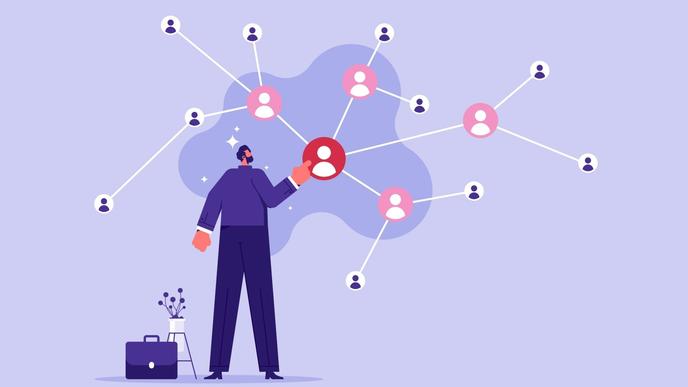How to Maintain Professional Connections Without Burnout or Being Overbearing
Maintaining professional connections is a task that is both important and delicate. We live in a world where communication is not just a tool, but a part of professional identity.

It's as if we carry with us an invisible network of contacts from which we draw ideas, support, opportunities, and inspiration. But this same network can become a burden if you handle it incorrectly: be too intrusive, and you create the impression of someone who uses others. Be too distant, and you can easily lose valuable connections without even noticing. And at some point, many people encounter fatigue: communication turns into an obligation, and interaction becomes emotional labor.
But is it possible to build interactions so that they are lively, natural, mutual - and at the same time do not drain you or end prematurely? Is it possible to stay in touch without feeling that you owe something to everyone? And how do you maintain professional relationships without turning yourself into someone who is "always writing to ask for something"?
In fact, yes - it is possible. You simply need to stop viewing networking as a project and start perceiving it as a continuation of human relationships. In this article, we will explore how to maintain professional connections gently, respectfully, and sustainably - and not burn out in the process.
Why Professional Communication Has Become So Energy-Consuming
We often evaluate our fatigue as if it arises from the number of tasks. But in most cases, exhaustion is not about the number of contacts, but about the format of communication. We can communicate a lot yet feel calm if the interaction is natural and mutual. And we can burn out from a couple of conversations if they contain too many expectations, tension, the role of "needing to be liked," or when the communication is too emotionally intense: you have to guess the reaction, adjust yourself, try not to say something wrong.
The modern professional world has made things even more complicated: now we maintain dozens of message threads, respond to social media messages, keep in mind "I should write to so-and-so," and message for work until late at night. Boundaries have nearly disappeared, and communication - which was meant to be a resource - has become a stress factor.
But the key insight is that maintaining connections does not mean constant activity. A connection is not about how often you write, but about how harmonious and respectful your interaction is. Sometimes just a couple of short messages a year, with the right tone, are enough to keep a connection truly alive.
"Light Touches" as the Key to Natural Professional Communication

Professional relationships are built primarily on the feeling of human presence - light, unobtrusive, friendly. Not on the frequency of messages, not on mutual benefit, but on respect for another person's space and a sincere desire to stay in touch. That's why soft, effortless "touches" work better than any intrusive attempts to "keep in contact." This is a form of communication that doesn't require emotional effort from you, yet it creates a sense of stable relationships.
For such "touches" to feel natural, it's important to give up the idea that every contact must be useful. Value arises not from benefit, but from attention. When you occasionally respond to a person's post, comment on their work, or simply send a short message, you're not asking for anything in return - and that is exactly what builds trust.
This communication is not about KPIs, not about contacts for the sake of contacts - it's about genuine interest. But this interest should be light. If you have been following a person for a while without trying to impose yourself, you'll notice how even a short message is received warmly because it's based on attentiveness rather than "strategic networking." Examples of light touches include:
-
responding to a post or story;
-
congratulating someone on a professional achievement;
-
recommending an interesting article or film;
-
a brief thank-you for an idea you used in your work;
-
a comment under a post (but only related to the topic!).
These touches don't require effort, don't drain you, and don't disrupt your daily life. They create a sense of a living connection - precisely because they happen by choice, not by obligation. This is the most natural way to stay in touch for years.
Lectera’s Online Courses by topic
How to Maintain Connections Without Overloading Yourself
Communication fatigue often doesn't come from the number of people, but from an internal feeling of "I owe something to everyone." This tension makes communication heavy and turns even friendly interactions into emotional labor. To avoid this, it's important to build a system that works softly and organically.
- A light personal contact calendar
This is not a strict list or a work tool, but rather a gentle reminder to yourself about people you genuinely like and find interesting. You don't need to write to everyone - just 1-2 names per month is enough. Such a calendar removes the guilt about "forgetting" people because you see that the contact will happen naturally and at the right time. It also frees your mind - you simply look at the list and take a small action.
- The principle of "not forcing yourself"
If you don't have the energy to communicate - a pause is completely normal. Professional relationships don't collapse because of silence if they are built on respect. People have busy lives, and they understand when space is needed. Allowing yourself to take breaks reduces emotional load and prevents you from draining energy just to maintain an image of someone who is "always available."
- Natural reasons to reach out
The most pleasant interactions are those that arise spontaneously. Saw news about someone? Write them. Remembered their idea while working? Share it. This creates a sense of organic communication. Such reasons don't feel forced and come across as genuine because they arise from real interest, not from the task of "maintaining a connection."
- Limiting communication time
This helps you cope with the fragmentation of modern communication. You can set aside a weekly "communication window" - just 10-20 minutes. During this time, you can respond to messages, send a couple of light touches, clear up discussions. This reduces internal anxiety and removes the feeling that you are constantly behind on replies. It also helps maintain focus, because you know you have allocated specific time for communication.
How Not to Appear Too Intrusive

Intrusiveness is always about pressure, not the number of messages. To leave a soft, professional, and tactful impression, it's important to follow a few principles that make communication comfortable for the other person while also protecting your own energy.
- Write only when you truly don't expect a reply
This is not just a suggestion - it's the foundation of light and organic communication. When you write without expectations, your message carries no hidden tension, and the other person feels free, not obligated to respond immediately. Such tone is perceived as a friendly gesture, not an attempt to get something or force a conversation. Moreover, this reduces your own anxiety: you are not tied to the other person's reaction and don't check your messages constantly. This protects you from burnout and makes communication natural.
- Avoid hidden requests
Phrases where a request is disguised as friendliness are always noticeable - even if the person cannot articulate it. It's better to honestly state what you need than to create an atmosphere of mild manipulation. Openness gives the person freedom of choice and shows that you respect their time and boundaries. A direct request does not seem rude; it seems mature, professional, and saves energy for both sides. Over time, such honest communication strengthens trust and makes connections more solid.
- Allow people to be silent
Silence is not a sign of dislike, not ignoring, and not a rejection of the connection. It's simply a part of the normal rhythm of another person's life. They may have deadlines, personal events, travel, emotional burnout - countless reasons for delayed responses. If you respond calmly to pauses and don't take them personally, you remove a huge layer of tension from communication. People sense when they are given "air," and they return to dialogue much more willingly because they know you don't pressure them or demand attention.
- Don't send message chains
When you write "Did you see my message?", "Hello?", "Let me know when you can reply" after your main message, it feels like pressure - even if you didn't intend it that way. The person may be busy, traveling, stressed, or simply not ready to respond, and every additional "ping" increases tension. One thoughtful message is better than ten small reminders. It shows respect and forms an image of someone confident who doesn't need constant confirmation of the contact. In the long run, this creates a much healthier communication dynamic.
Professional relationships are part of our lives, not a reporting system. They develop when we show interest without pressure, attention without expectations, and involvement without intrusiveness. You can maintain contacts for many years gently, easily, without burnout - if you stop perceiving communication as an obligation and start treating it as a living process.
Light touches, sincerity, a natural rhythm, healthy boundaries - all of these create a space where communication becomes a resource, not a burden. And the most surprising thing: the less effort you apply and the more you trust naturalness, the stronger your connections become. Because real relationships are built not on message frequency, but on respect - for yourself, for others, for communication itself. Don't forget that!
Share this with your friends via:
Latest News

A significant stage in the development of the alternative education system has begun in West Northamptonshire in the UK: the County Council is actively calling on parents, guardians, and trustees to participate in shaping the future of this key area.

Outwoods Primary School in Atherstone, Warwickshire, having experienced deep sadness after the loss of their famous cat, Silla, has found solace in a new pet – a Maine Coon named Aloysius O’Hara.

In modern universities, artificial intelligence, and in particular ChatGPT, is rapidly transforming from a controversial tool into a full-fledged student assistant.

An innovative educational project is gaining momentum in UK primary schools, aiming to change attitudes towards video games.

The Massachusetts Institute of Technology (MIT) presents MIT Learn – a revolutionary online platform that opens a “new front door” to access university knowledge and resources.












 Test. Check Your Social Media Dependency Level!
Test. Check Your Social Media Dependency Level!
 Test: What Business is Right For You?
Test: What Business is Right For You?
 “I’m Here for the Long Haul”: When Loyalty to a Company Becomes Toxic
“I’m Here for the Long Haul”: When Loyalty to a Company Becomes Toxic
 Test: How Prone Are You to Abusive Behavior as a Manager?
Test: How Prone Are You to Abusive Behavior as a Manager?
 Test. What superpower would you possess if you were a superhero?
Test. What superpower would you possess if you were a superhero?
 Test. What Should You Let Go of Before Winter Ends?
Test. What Should You Let Go of Before Winter Ends?
